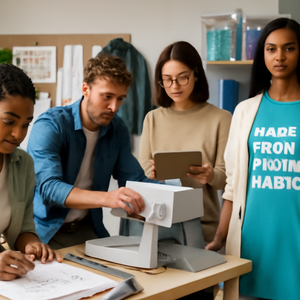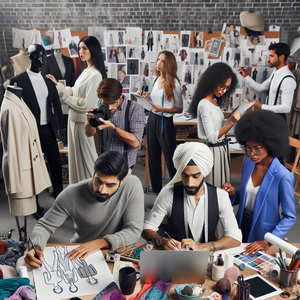
20 Careers Turning Ocean Plastic into Fashion: Real Jobs, Real Impact
A few years ago, standing on a remote Pacific beach, I was struck by the sheer amount of plastic littered across the sand. That moment was a wake-up call, highlighting the urgent need to address ocean plastic pollution. Today, the fashion industry is stepping up, transforming marine waste into innovative apparel and accessories. Brands like Adidas, Patagonia, and Girlfriend Collective are leading the charge, but the real impact comes from a network of professionals—engineers, designers, scientists, and more—who are reshaping the future of sustainable fashion. This article explores 20 careers making a real difference by turning ocean plastic into fashion, offering insights, real-world examples, and guidance on how to get involved.
Job Summaries:
Textile Engineer (Ocean Plastic Innovations):
- Textile engineers convert marine plastics into usable fibers for fashion.
- At Adidas, engineers developed Parley Ocean Plastic yarn, now used in millions of sneakers.
- Skills include textile/polymer engineering and sustainable materials expertise.
- Career paths often start in lab roles and progress to R&D leadership.
Sustainable Fashion Designer:
- Designers create clothing and accessories from recycled ocean plastics.
- Brands like Londre and Iris Van Herpen showcase the creative potential of upcycled debris.
- Key skills include fashion design, eco-materials knowledge, and creativity.
- Salaries vary widely based on experience and brand.
Product Development Manager (Recycled Materials):
- Oversee the entire lifecycle of products made from ocean plastic
- Coordinate sourcing, processing, and testing of materials
- At Sea Threads, ensure shirts are made from 100% ocean plastic
- Skills required: project management, supply chain expertise, and sustainable sourcing
Supply Chain Sustainability Analyst:
- Analysts trace recycled materials and work to reduce emissions throughout the supply chain.
- Patagonia’s analysts track recycled polyester from ocean to store, requiring skills in environmental science, supply chain management, and life cycle assessment.
Ocean Plastic Collection Coordinator:
- Coordinators organize plastic recovery efforts with NGOs and communities.
- Bureo, for example, intercepts fishing nets in Chile for upcycling.
- Project management and marine conservation skills are essential.
Circular Economy Specialist:
- Specialists design closed-loop systems for repair, resale, and take-back programs.
- Parley’s AIR strategy (Avoid, Intercept, Redesign) is a leading example.
- Skills include systems thinking and business strategy.
Marketing Manager (Sustainable Brands):
- Marketing managers craft authentic narratives for eco-friendly brands, avoiding greenwashing.
- Bionic Yarn’s campaigns with Pharrell Williams set high standards for storytelling.
- Skills include marketing and ethical communication.
Material Scientist (Recycled Plastics):
- Material scientists invent new polymers and fibers from ocean plastics.
- Econyl’s regenerated nylon, now used by Prada, exemplifies this innovation.
- Chemistry, R&D, and lab experience are key skills.
Quality Assurance Specialist (Eco-Fabrics):
- QA specialists test the safety and durability of new textiles.
- Oceanness relies on these experts to maintain certifications like GRS.
- Skills include textile testing and attention to detail.
Environmental Compliance Officer:
- Compliance officers ensure that production processes meet environmental laws and standards.
- Both Patagonia and Adidas employ teams for this work, requiring knowledge of environmental law and auditing.
Community Outreach Coordinator (Ocean Cleanups):
- Outreach coordinators mobilize volunteers and run educational events about ocean plastic.
- Parley’s youth programs are a prime example.
- Event planning and public speaking skills are vital.
Garment Technologist (Recycled Materials):
- Technologists solve technical challenges in making wearable fabrics from recycled plastics.
- Girlfriend Collective’s team refined leggings made from bottles.
- Skills include fashion technology and prototyping.
Brand Sustainability Strategist:
- Strategists set and measure sustainability targets, reporting progress transparently.
- Adidas’ annual sustainability reports are benchmarks in the industry.
- Corporate sustainability and reporting skills are essential.
Product Lifecycle Analyst:
- Analysts assess the environmental impact of products from ocean to end-of-life.
- Bureo publishes transparent data on their NetPlus materials.
- Skills include data analysis and environmental reporting.
Social Media Content Creator (Eco-Fashion):
- Content creators share behind-the-scenes stories to educate and inspire audiences.
- Oceanness’ Instagram provides a model for effective storytelling.
- Skills include digital marketing and storytelling.
Recycling Facility Manager (Plastic Processing):
- Managers run facilities that process ocean plastic into raw materials.
- Seaqual Initiative coordinates such operations globally.
- Operations management and leadership skills are crucial.
Eco-Certification Specialist:
- Specialists guide companies through certifications like the Global Recycled Standard (GRS).
- Girlfriend Collective’s certified products set traceability standards.
- Auditing and documentation skills are required.
R&D Scientist (Fabric Innovation):
- R&D scientists experiment with new blends of ocean plastics for improved performance.
- Adidas teams have developed UV-resistant, high-performance yarns.
- Lab research and polymer science are key skills.
Environmental Educator (Fashion & Oceans):
- Educators teach about the intersection of fashion and ocean health.
- Audiences range from schools to corporations.
- The Plastic Pollution Coalition’s workshops are a leading example.
- Teaching and marine ecology expertise are needed.
Upcycling Designer (Accessories & Home Goods):
- Designers transform ocean plastics into accessories and home goods.
- Examples include Bureo’s NetPlus skateboards and sunglasses.
- Product design and prototyping skills are essential.
A career in ocean plastic fashion is both rewarding and challenging. While progress is evident—like Adidas’ shift to recycled polyester—scalability and consumer skepticism remain hurdles. The most impactful professionals embrace transparency, continuous learning, and collaboration. If you’re ready to make a difference, start by learning, networking, and volunteering. The journey is tough, but the oceans—and future generations—depend on it.
Explore More Jobs

